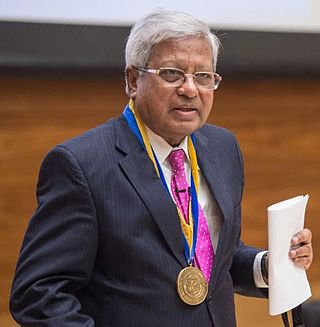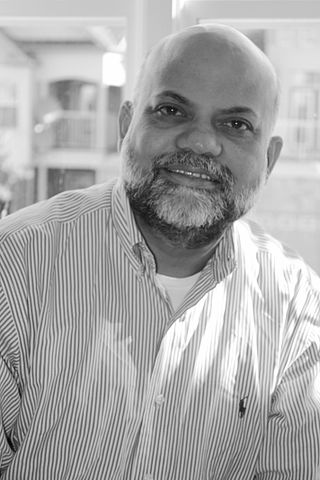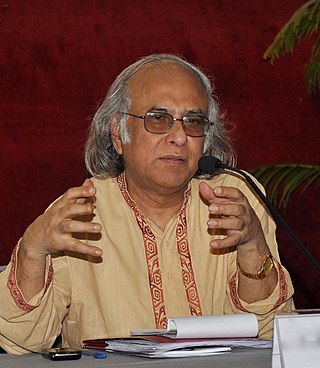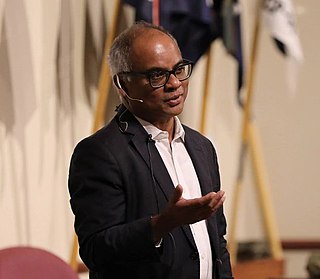Related Research Articles

Muhammad Yunus is a Bangladeshi economist, entrepreneur, politician, and civil society leader, who has been serving as Chief Adviser of the interim government of Bangladesh since 8 August 2024. Yunus was awarded the Nobel Peace Prize in 2006 for founding the Grameen Bank and pioneering the concepts of microcredit and microfinance. Yunus has received several other national and international honors, including the United States Presidential Medal of Freedom in 2009 and the Congressional Gold Medal in 2010.

WaterAid is an international non-governmental organization, focused on water, sanitation and hygiene. It was set up in 1981 as a response to the UN International Drinking Water decade (1981–1990). As of 2018, it was operating in 34 countries.

Community-led total sanitation (CLTS): is an approach used mainly in developing countries to improve sanitation and hygiene practices in a community. The approach tries to achieve behaviour change in mainly rural people by a process of "triggering", leading to spontaneous and long-term abandonment of open defecation practices. It focuses on spontaneous and long-lasting behaviour change of an entire community. The term "triggering" is central to the CLTS process: it refers to ways of igniting community interest in ending open defecation, usually by building simple toilets, such as pit latrines. CLTS involves actions leading to increased self-respect and pride in one's community. It also involves shame and disgust about one's own open defecation behaviours. CLTS takes an approach to rural sanitation that works without hardware subsidies and that facilitates communities to recognize the problem of open defecation and take collective action to clean up and become "open defecation free".

Sir Fazle Hasan Abed was the founder of BRAC, one of the world's largest non-governmental organizations.

Ismail Serageldin, Founding Director of the Bibliotheca Alexandrina (BA), the new Library of Alexandria, inaugurated in 2002, is currently, Emeritus Librarian, and member of the Board of Trustees of the Library of Alexandria. He serves as Chair or Member of a number of advisory committees for academic, research, scientific and international institutions and civil society efforts, and serves on the Advisory Committee of the World Social Science Report for 2013 and 2016, as well as the UNESCO-supported World Water Scenarios (2013) and the executive council of the Encyclopedia of Life (2010) and Chairs the Executive Council of the World Digital Library (2010). He also co-chaired the African Union's high level panel for Biotechnology (2006) and again for Science, Technology and Innovation (STI) in 2012–2013, and was a member of the ICANN Panel for the review of the internet future (2013).

Iqbal Z. Quadir is an entrepreneur and promoter of the role of entrepreneurship and innovation in creating prosperity in poverty stricken countries. He has taught at Harvard Kennedy School and at Massachusetts Institute of Technology. He is the brother of Bangladeshi-American entrepreneur and artist Kamal Quadir.

Bangladesh is faced with multiple water quality and quantity problems along with regular natural disasters, such as cyclones and floods. Available options for providing safe drinking water include tubewells, traditionally dug wells, treatment of surface water, desalination of groundwater with high salinity levels and rainwater harvesting.

Emmett John Rice was an American economist, academic, bank executive, and member of the Federal Reserve Board of Governors. He served with the Tuskegee Airmen during World War II, taught at Cornell University during the 1950s, and was a noted expert in the monetary systems of developing countries. Susan Rice, former United States Ambassador to the United Nations and National Security Advisor to Barack Obama, is his daughter.
Swadesh Ranjan Bose was a Bengali language movement activist and an economist. For his contributions to the field of economics he was posthumously given the Independence Day Award, Bangladesh's highest state award.

The Global Water Security & Sanitation Partnership (GWSP), formerly the Water and Sanitation Program, is a trust fund administered by the World Bank geared at improving the accessibility and infrastructure of water and sanitation for underdeveloped countries. GWSP works in more than 25 countries through regional offices in Africa, East and South Asia, Latin America, the Caribbean, and an office in Washington, D.C. Heath P. Tarbert is the Acting Executive Director for the United States. The GWSP is best known for its work providing technical assistance, building partnerships and capacity building. GWSP focuses on both regulatory and structural changes and also behavior change projects, such as a scaling up handwashing project and scaling up sanitation project. Another key aspect of GWSP's work is sharing knowledge and best practices through multiple channels. The GWSP has determined five main focus areas: Sustainability, inclusion, institutions, financing, and resilience.

The International Growth Centre (IGC) is an economic research centre based at the London School of Economics, operated in partnership with University of Oxford's Blavatnik School of Government.

Joe Madiath is an Indian social entrepreneur. He is the founder and former executive director of Gram Vikas, a non-governmental organisation based in Odisha, India. Gram Vikas uses common concerns for water and sanitation to unite and empower rural communities, including adivasi communities.

Qazi Kholiquzzaman Ahmad is a Bangladeshi economist and development thinker and activist. He is currently the chairman of Dhaka School of Economics (DScE), a constituent institution of the University of Dhaka, devoted to post-graduate studies in economics and related subjects. He is former chairman of Palli Karma-Sahayak Foundation (PKSF), which is largest rural development funding, skill development and management support agency in Bangladesh. He received the highest national civilian award Independence Award 2019; and Ekushe Padak 2009, presented by the Government of Bangladesh.

Open defecation is the human practice of defecating outside rather than into a toilet. People may choose fields, bushes, forests, ditches, streets, canals, or other open spaces for defecation. They do so either because they do not have a toilet readily accessible or due to archaic traditional cultural practices. The practice is common where sanitation infrastructure and services are not available. Even if toilets are available, behavior change efforts may still be needed to promote the use of toilets. 'Open defecation free' (ODF) is a term used to describe communities that have shifted to using toilets instead of open defecation. This can happen, for example, after community-led total sanitation programs have been implemented.

John Briscoe was a South African-born environmental engineer who was Visiting Professor of the Practice of Environmental Health in the Department of Environmental Health at Harvard School of Public Health. He was known as "Mr. Water" to environmental economists. At Harvard, Briscoe also held appointments at the Harvard School of Engineering and Applied Sciences (SEAS) as Gordon McKay Professor of the Practice of Environmental Engineering, and at the Harvard Kennedy School. His career focused on efforts on the developing world to successfully manage and preserve water as a precious resource. In early 2014, he received the Stockholm Water Prize - the “Nobel Prize of Water" - for "unparalleled contributions to global and local management of water - contributions covering vast thematic, geographic, and institutional environments-that have improved the lives and livelihoods of millions of people worldwide.”

Abul Kalam Abdul Momen, known as AK Abdul Momen, is a Bangladeshi economist, diplomat, and politician who served as minister of foreign affairs from January 2019 to January 2024. He served as permanent representative of Bangladesh to the United Nations from August 2009 until October 2015. He was elected a member of Jatiya Sangsad from the Sylhet-1 constituency at the 2018 general elections. Following his election, he was appointed the minister of foreign affairs by the Prime Minister Sheikh Hasina.
Muslehuddin Ahmad was a Bangladeshi diplomat and university administrator. He was the founder of North South University, the first private university in Bangladesh and served as its first vice-chancellor. He was the ambassador of Bangladesh to France and Romania.

Kamal Ahmad is a Bangladesh-born, now U.S. national, educator and social entrepreneur. He led the creation of the Asian University for Women located in Chittagong, Bangladesh in 2006.

Mohammad Kabir Hassan is a Bangladeshi-American economist who serves as Professor of Finance at University of New Orleans. He has been providing consultancy to International Monetary Fund, World Bank, Transparency International Bangladesh, African Development Bank, Islamic Development Bank and Government of Turkey.

Arun Arya is a former Indian Administrative Service (IAS) officer and an international Senior Public Finance Adviser. Arun was an Indian Administrative Service (IAS) officer for 20 years where he held several high-ranking positions. Arun worked as the Senior Public Sector Management Specialist for the World Bank for 16 years; Senior Sector Adviser, Water and Sanitation, for the Danish International Development Agency (DANIDA) for 2 years; and, Senior Public Finance Adviser for the Deutsche Gesellschaft für Internationale Zusammenarbeit (GIZ).
References
- 1 2 3 4 "Junaid Kamal Ahmad". World Bank. Retrieved 21 September 2016.
- 1 2 3 "Bangladesh's Junaid Ahmad Is The New World Bank Head In India". Huffington Post. 20 September 2016. Retrieved 21 September 2016.
- ↑ "Bangladesh economist WB head in India". The Daily Star. 21 September 2016. Retrieved 21 September 2016.
- ↑ "World Bank Announces New Country Director for India". World Bank. 20 September 2016. Retrieved 21 September 2016.